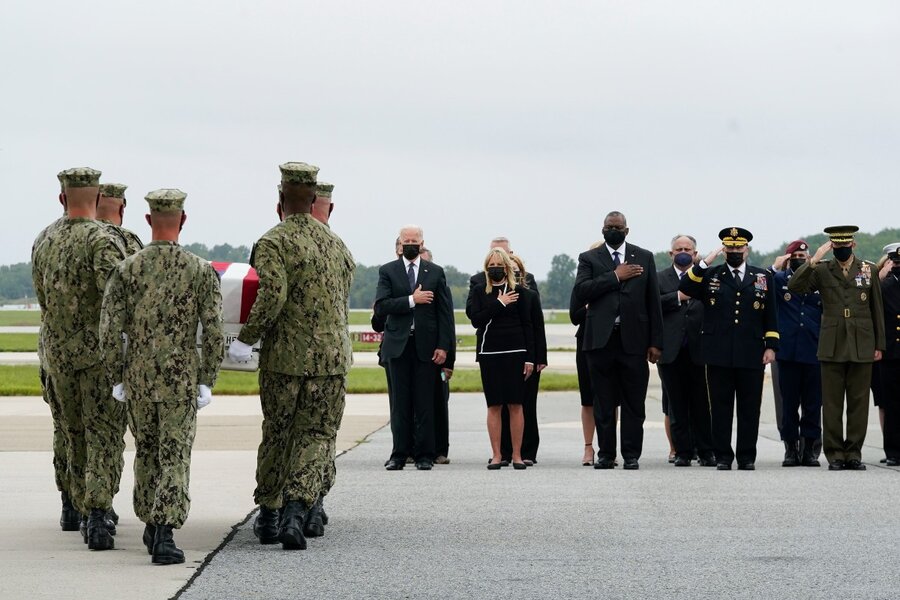Biden pays respects to US troops killed in Afghanistan attack
Loading...
| Dover Air Force Base, Del.
In hushed reverence, President Joe Biden stood witness with grieving families Sunday under a gray sky as, one by one, the remains of 13 U.S. troops killed in the Kabul suicide bombing were removed with solemnity from a military aircraft that brought them home.
The only sounds that could be heard during the mournful ritual of the “dignified transfer” were the quiet commands of the honor guards in battle dress who carried the flag-draped cases, the hum of the C-17 aircraft that had transported the fallen and the periodic sob of the sorrowful.
Biden and his wife, Jill, met privately with family members of those killed in the suicide attack near the Kabul airport before the president became the fourth commander in chief over two decades of war to stand at attention at Dover Air Force Base as the remains of the fallen from Afghanistan returned home.
The dead ranged in age from 20 to 31, and came from California and Massachusetts and states in between. Five were just 20 — born not long before the attacks of Sept. 11, 2001, that spurred the United States to invade Afghanistan in order to topple al-Qaida and dismantle their Taliban hosts who ruled the country.
They include a 20-year-old Marine from Wyoming who had been expecting his first child in three weeks and a 22-year-old Navy corpsman who in his last FaceTime conversation with his mother assured her that he would stay safe because “my guys got me.”
At their deaths, the 13 young service members were on the ground for the U.S. coda to its longest war, assisting a chaotic evacuation of Americans and of Afghans who helped the U.S. war effort and are now fleeing the Taliban after their return to power.
“The 13 service members that we lost were heroes who made the ultimate sacrifice in service of our highest American ideals and while saving the lives of others,” Biden said in a statement Saturday. “Their bravery and selflessness has enabled more than 117,000 people at risk to reach safety thus far.”
Biden held his hand over his heart and appeared to shut his eyes in prayer as each transfer case was taken off the military aircraft and placed in an awaiting vehicle.
Family members of the fallen often travel to Dover to be present for the return of the remains of their loved ones to American soil. Thursday's attack left so many casualties that military officials said the Dover Fisher House, which the Defense Department provides for families of the fallen, was not large enough to accommodate all the grieving families, so some loved ones stayed off base.
Biden was joined by several top aides, including Defense Secretary Lloyd Austin, chairman of the Joint Chiefs of Staff Gen. Mark Milley, and Secretary of State Antony Blinken. Eleven of the fallen service members’ families chose to allow their transfers to be open to media coverage. Two others took place out of view, but Biden was present for those as well.
Biden's three most recent predecessors as presidents all attended such dignified transfers. It was Biden's first time taking part in the ritual as president, but he has been here before.
Later Sunday, while getting a Hurricane Ida briefing at the Federal Emergency Management Agency in Washington, the president opened his remarks by telling workers that he had just come from Dover. "We met with the families of 13 fallen heroes in Afghanistan who lost their lives in their service of our country and while we’re praying for the best in Louisiana, let’s keep them in our prayers as well.’’
Biden attended a dignified transfer for two U.S. soldiers killed in a suicide blast at Bagram Airfield in the final months of his vice presidency in 2016. In 2008, while a senator and at the request of the grieving family, he attended one for a soldier killed in a car bombing in Iraq. Biden told CBS' “Face the Nation” that he had to get permission from the Pentagon to attend the transfer.
The 13 troops who died in Kabul were the first U.S. service members killed in Afghanistan since February 2020. That was when the Trump administration reached an agreement with the Taliban that called for the militant group to halt attacks on Americans in exchange for a U.S. commitment to remove all American troops and contractors by May 2021. Biden announced in April that he would have all forces out by September.
Eleven of the 13 Americans killed were Marines. One was a Navy sailor and one an Army soldier.
___
Associated Press writers Lolita C. Baldor, Robert Burns and Matt Sedensky contributed to this report.







